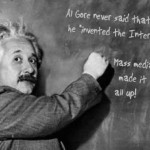 Over the years I’ve written a number of times about the various attempts made by researchers to map (and predict) the way misinformation spreads online.
Over the years I’ve written a number of times about the various attempts made by researchers to map (and predict) the way misinformation spreads online.
With the election in Britain culminating today, and the American presidential election due to begin in earnest before too long, it’s particularly pertinent to explore how misinformation spreads in a political context.
A recent study from MIT academic Adam Berinsky set out to explore the lifecycle of political rumors. It suggests that attempts to try and debunk political rumors and myths may do little but make them stronger.
“Rumors are sticky,” Berinsky says. “Corrections are difficult, and in some cases can even make the problem worse.”
For instance, when attempts were made to correct rumors surrounding supposed ‘death panels’ in the Affordable Care Act (ACA), it often caused belief in such panels to increase.
How to correct false information
So what can you do? The paper suggests that the best method is to use a figurehead with a broad political appeal that can debunk the rumors, which given a recent study highlighting how little cross party collaboration is happening it may be a somewhat futile search.
Nevertheless, it should go without saying that the quality of political discourse is significantly undermined by the persistence of ill-founded myths and rumors.
The paper consisted of three surveys of around 2,000 voters, with the surveys using a range of methods to try and debunk rumors about the ACA.
When the voter was ‘attentive’, it emerged that just over half rejected the initial rumors, with the figure rising a few percent when a nonpartisan correction of the myth was heard, which was the same as when a Democrat corrected the myth.
When a Republican corrected the myth however, the number of people who rejected the rumor grew by over 10 percent.
The other experiments produced similar results, with an acceptance rate rising across all scenarios, with only the Republican based counter-balance affecting the rejection rate.
The paper contends that the reason for this failure to convert skeptical voters is down to the apparent lack of neutral sources of information.
“No one perceives these [sources] as nonpartisan,” it says.
We love a good myth
The truly scary thing is that we tend to love myths. When presented with seven different myths, including Obama being a Muslim and the 2004 election being swung by vote fraud in Ohio, the average respondent believed nearly 2 of the 7.
It isn’t, therefore, the case that myths are sustained by a small minority of crackpots, but rather something that most of us will gladly engage with in some way.
“It’s not that there are some people who believe a lot of crazy things,” Berinsky says. “There are a lot of people who believe some crazy things.”
Of course, you might justly argue that we tend to love myths because we succumb to the confirmation bias and therefore hunt down information that supports our prejudices, regardless of how reliable that information is.
It would be lovely to think of voters as rational beings that will gladly change their opinions if provided with more accurate knowledge, but I’m not sure how realistic that really is.
Nevertheless, it’s a topic that Berinsky has explored in some depth, and he’s due to publish a book on the topic in the next year, which should make interesting reading.
“There is a lot more interest in trying to find out how people think, rather than assuming you know how they think,” he says.
I'd love to say this surprises me, but I'm not at all. It's a major reason why it's so difficult to trust anything politicians say.
I'm inclined to think that the politicians thrive on the misinformation. Indeed, many of them are only too happy to propagate it (so long as it benefits them)